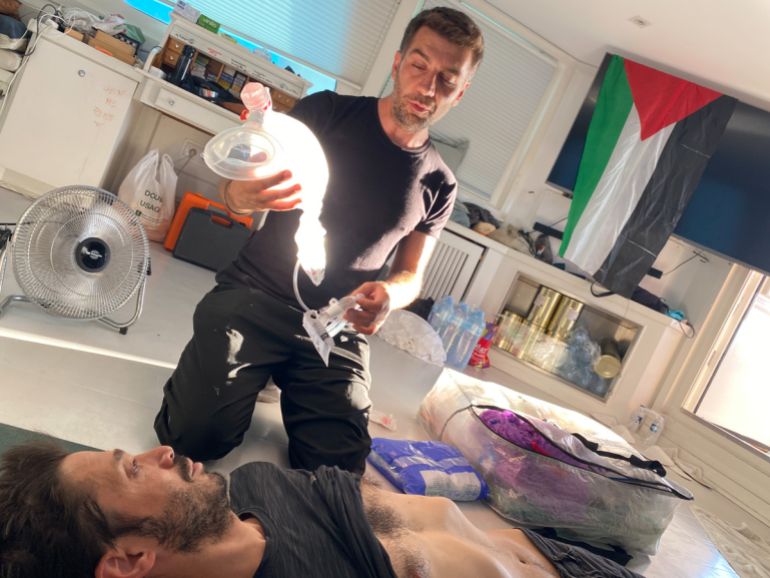Mediterranean Sea – Everyone gathered on the top deck of a Global Sumud Flotilla vessel, which had volunteers determined to deliver the supplies.
Life vests, head counts, and designated muster points were all reviewed and put into practice as security protocols in case of an emergency.
They were getting ready for collisions, fire, someone falling overboard, or other possible scenarios on any vessel.
This training, however, was different because of a different situation.
In the event that Israeli soldiers boarded the vessel, intercepted it, or detained them, they were given instructions on how to raise their hands. The main goal is to carry out their mission in a non-violent manner.
After departing from Sicily, Italy, the flotilla was approaching the “yellow zone,” which is the area where Israeli attacks are possible in international waters between Italy and Cyprus.
Old propaganda strategy
The humanitarian flotilla, which is attempting to remove the Israeli military’s hold on the people of Gaza, was recently referred to as a “jihadi flotilla” by the Israeli ministry of foreign affairs, who claimed it has ties to Hamas.
Hamas, a jihadi organization, has publicly supported the so-called “Flotilla to Gaza.”
We demand mobilization of all means to support the Gaza-bound Global Steadfastness Flotilla, according to Hamas.
Not at all humanitarian. This is a jihadist initiative that advances the terror group’s goals. pic. twitter.com/vciWdnTswC
Itamar Ben-Gvir, the minister of national security in Israel, made the announcement earlier this month that he wanted to detain the humanitarian activists as they were leaving Spain.
Saif Abukeshek, a member of the flotilla steering committee, described these claims as “psychological warfare” and said: “The propaganda is an old strategy” in an interview on Saturday.
A coordinator tells the gathered group during training that “we have to decide collectively whether we will react or whether someone should intervene if soldiers begin to beat one of us.”
The question was met with silence, but it was impossible to avoid. The coordinator took the initiative while wearing a bullhorn.
I don’t want any of you to react or order the soldiers to stop if I’m dragged or beaten. Respect my choice, please.
The bullhorn was circling. The volunteers each repeated the phrase one by one. The phrase was reduced to the three volunteers’ two words: “the same.” It was echoed by everyone who volunteers.
The intent behind the strategy was to stop more hostility. They might start a new conflict by threatening any reaction by even asking Israeli soldiers to stop.
One volunteer put it this way: “If you react or speak up while being beat, you will not only put your own safety at risk, but you will also violate the group’s will.”
Another person stated to Al Jazeera, “We are aware of the risks we have taken and why we are here.”
Physical and mental strains
Organizers and volunteers have had to deal with the delays and difficulties the flotilla has encountered.
Everyone has been under pressure because of drone attacks at Tunisian ports, technical difficulties faced by boats ill-suited for the high seas, and general difficulties in organizing an underfunded civilian initiative to sail to Gaza.
While their companions sleep, everyone on board must also perform a night watch, keeping an eye out for more drone attacks all night.
When asked what keeps them going, each of them cites the need to intervene to help Gaza’s citizens who are suffering from bombardments, starvation, and loss as a result of Israel’s war.
Because Israel has intercepted all previous flotillas, including the one that killed ten people aboard the Mavi Marmara ten years ago, they are aware that they are heading into risky waters.
After making difficult decisions, the boats had already left Tunisia for Sicily on Tuesday, with fewer people on board.
More people wanted to board a flotilla boat than there was capacity, especially since some of the vessels failed technical inspections, raising questions about their ability to deal with the Mediterranean’s unpredictable nature.

Tunisian Bizerte read lists. As volunteers who had formed strong emotional ties bid their farewells among the boats, crews were rearranged and tears poured down.
Their involvement in the mission was ended at this point, but they would continue to support the flotilla that was headed for Gaza.
Some contacted the coordinators to ask for their reserved seats. On the boats, other people waited patiently with their coworkers before returning to a hotel to board the planes to check in with them.
Please place this Palestinian flag on the boat, please. It has been in my friend’s window for years, according to Marcin, a Norwegian-born Polish volunteer who was one of the crew members who was removed.
After that, everyone boarded the ships they had assigned and met their crews. All hands were on deck to clean and get ready for the ship’s upcoming Italy-bound journey. Some of the volunteers have sailing experience, while others have little sailing experience.
The boats have returned to Italy after a short while, sailing through the yellow zone and getting ever closer to the red zone, where the danger grows 100 nautical miles (185 kilometers) away from the Gaza shore.
The drills continue, too.

Source: Aljazeera

Leave a Reply